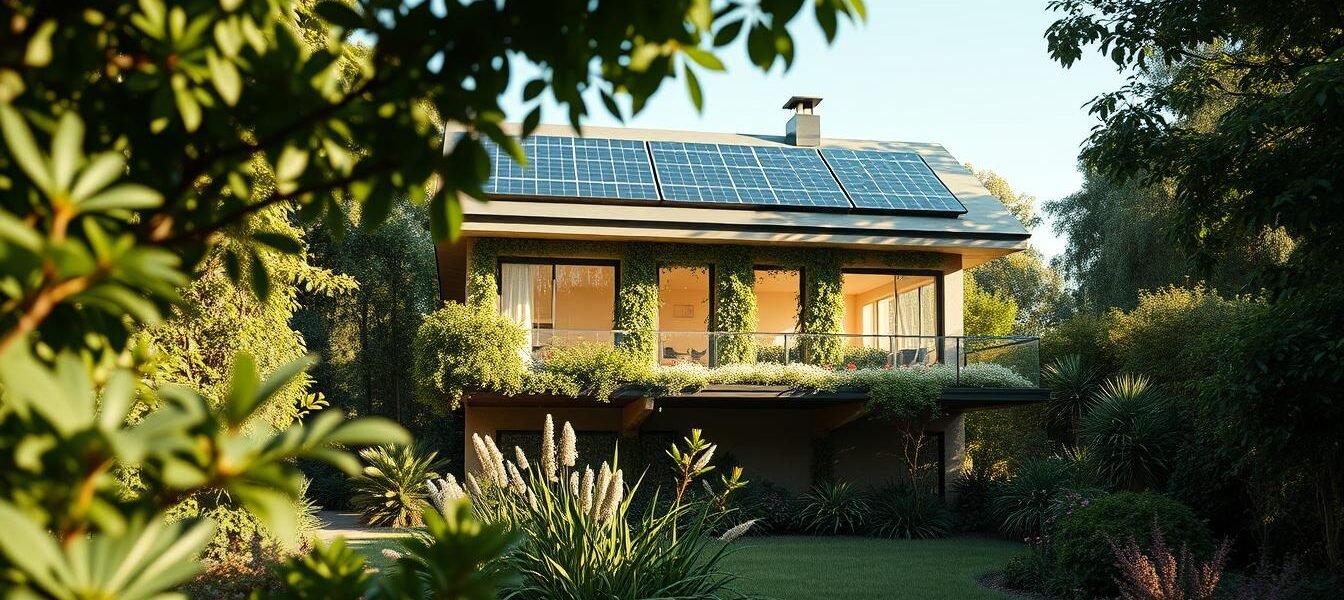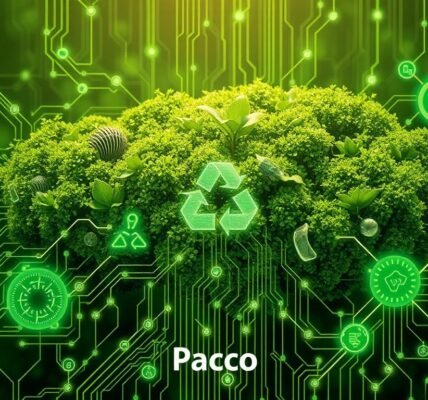Smart Home Innovations for Eco-Friendly Living Today
In today’s world, we’re all thinking more about the planet. Smart home tech is changing how we live in a green way. It brings us advanced automation and smart homes that help us live better and reduce harm to the environment. But have you thought about how these new technologies are changing our homes?
Key Takeaways
- Smart home innovations integrate advanced technology with sustainable practices to reduce environmental impact.
- The evolution of smart home technology has led to the development of intelligent ecosystems that optimize energy usage, water conservation, and overall eco-friendliness.
- Smart home solutions are designed to provide cost-effective and energy-efficient solutions for homeowners.
- Innovative features like smart thermostats, intelligent lighting systems, and water conservation technologies are revolutionizing eco-friendly living.
- The integration of renewable energy and smart appliances further enhances the sustainable capabilities of modern smart homes.
Understanding the Evolution of Smart Home Technology
Smart home technology has changed a lot. It moved from simple automation to complex systems. The Internet of Things (IoT) has been key in making homes smarter. It lets different devices work together smoothly.
From Basic Automation to Intelligent Ecosystems
At first, smart homes were just about controlling lights and heat from afar. Now, they’re much more advanced. They can adjust to what you need and like, making your home smarter.
The Rise of IoT in Residential Spaces
IoT devices have made smart homes even better. Things like smart thermostats and security systems talk to each other. They also share info with you, making your home more automated and giving you insights in real-time.
Key Milestones in Smart Home Development
The smart home world has seen big changes. Smart thermostats, voice assistants, and AI systems have changed how we live. They let us control our homes in new ways.
| Milestone | Description |
|---|---|
| Smart Thermostats | Smart thermostats help save energy and control the temperature better. |
| Voice-Controlled Assistants | Voice assistants like Alexa and Google Assistant make controlling your home easy with just your voice. |
| AI-Powered Home Management | AI and machine learning make your home smarter. They help save energy and make your home more comfortable. |
Smart home tech is getting even better. With more IoT and smart systems, our homes will soon be more comfortable and efficient. This change will make our lives easier and more enjoyable.
Smart Home Innovations for Eco-Friendly Living
Smart home technology is changing how we live sustainably. These new solutions help cut down on waste by using less energy, water, and resources. They make homes more eco-friendly.
Energy-saving appliances are a big part of smart homes. They use less power when it’s not needed, cutting down on waste and pollution. Smart lights let you control your home’s lighting, saving energy without losing comfort.
Smart homes also help save water. They use sensors and weather forecasts to water plants just right. Tools that find leaks help stop water from being wasted. This way, smart homes help us use water wisely.
| Eco-Friendly Innovation | Description |
|---|---|
| Energy-Efficient Appliances | Smart devices with advanced power management to reduce energy consumption |
| Intelligent Lighting Systems | Automated lighting controls for optimal energy conservation |
| Smart Irrigation Systems | Sensor-based solutions for efficient water usage in landscaping |
| Leak Detection and Monitoring | Tools to identify and prevent water wastage throughout the home |
Smart homes are leading the way in sustainable living. Thanks to green technology and smart home solutions, we can live more eco-friendly. Homeowners can easily help make our world a better place.
“Smart home innovations are paving the way for a more sustainable future, empowering homeowners to reduce their environmental impact with ease.”
Energy-Efficient Smart Thermostats and Climate Control
Smart thermostats are changing the game for eco-friendly living. They use advanced tech to control your home’s temperature. This cuts down on energy waste and makes your home more comfortable.
AI-Powered Climate Optimization
Artificial intelligence (AI) has changed how smart thermostats work. They learn what you like and adjust the temperature for you. This makes your home more energy-efficient and saves you money on bills.
Zone-Based Heating and Cooling Solutions
Old HVAC systems can’t keep temperatures even everywhere. But smart home tech offers zone control. This means you can heat or cool only the areas you’re using, saving energy and making your home more comfortable.
Smart thermostats are key for eco-friendly living. They use AI and zone control to manage energy. This not only helps the planet but also saves you money and makes your home more comfortable.
Intelligent Lighting Systems and Energy Conservation
Smart home tech has changed how we save energy, and smart lights are key. They use LED technology, motion sensors, and automated lighting controls. This combo cuts down energy use and makes homes look better.
With smart lighting, homes can light up just right for everyone. These systems adjust light levels and colors based on the time of day and who’s around. This means homes use less energy but still feel cozy and look great.
| Smart Lighting Features | Energy Conservation Benefits |
|---|---|
|
|
Smart lights and saving energy go hand in hand now. Thanks to LED technology and automated lighting controls, homes are smarter and greener.
“Intelligent lighting systems not only save energy but also enhance the overall ambiance and comfort of a smart home.”
Water Conservation Through Smart Home Technology
Homeowners are now more focused on saving water, thanks to smart home tech. Smart irrigation systems lead the way. They adjust watering schedules based on weather, soil moisture, and plant needs. This ensures water is used wisely, without wasting it.
Smart home tech also helps with leak detection and prevention. Advanced sensors spot leaks fast and alert homeowners. They can then turn off the water to prevent damage and save water.
But there’s more to smart home tech than just irrigation and leak detection. Water usage monitoring and analytics give homeowners a clear view of their water use. This knowledge helps them make better choices and use water more wisely.
| Key Smart Home Water Conservation Features | Benefits |
|---|---|
| Smart Irrigation Systems | Optimize watering schedules based on weather, soil moisture, and plant needs |
| Leak Detection and Prevention | Quickly identify and shut off water leaks to minimize waste and damage |
| Water Usage Monitoring and Analytics | Provide detailed insights into consumption patterns to enable more sustainable habits |
By using these smart home technologies, homeowners can greatly reduce their water conservation. This helps make their homes and the environment more sustainable.
Renewable Energy Integration in Smart Homes
Using renewable energy is key for eco-friendly smart homes. Solar panels, wind turbines, and energy storage systems fit well into home systems. Smart grid integration helps use renewable energy better, cutting down on traditional power use and pollution.
Smart homes with renewable energy tech cut down on carbon and energy use. For example, solar panels can power homes. Energy storage systems, like batteries, save extra energy for later, keeping energy flow steady.
Also, smart grid tech lets homes send extra energy back to the grid. This makes energy systems more sustainable and efficient. Homeowners can use, make, and sell renewable energy, making the energy system stronger and more balanced.
| Renewable Energy Technology | Benefits |
|---|---|
| Solar Panels | Generate clean electricity, reduce carbon footprint |
| Wind Turbines | Harness wind power for energy generation, complement solar power |
| Energy Storage Systems | Store excess renewable energy for later use, ensure energy security |
| Smart Grid Integration | Enable efficient distribution and utilization of renewable energy, contribute to a sustainable energy infrastructure |
By using renewable energy tech in smart homes, homeowners can live more sustainably. They also save on energy costs and gain more independence from energy sources.
Smart Appliances for Sustainable Living
Smart appliances are key to a greener future in our homes. They offer advanced features and focus on saving energy. This helps us live more sustainably.
Energy Star-Rated Smart Devices
Energy Star-rated smart appliances are a big deal for the environment. They use less energy, which means less carbon emissions from our homes. These devices use smart sensors and algorithms to save power, helping us reduce our impact on the planet.
Automated Power Management
Smart appliances have automated power management. They adjust their energy use based on how we use them. This means they use less power when not needed, saving energy and keeping our homes efficient.
Smart Grid Integration
Smart appliances can talk to the smart grid, making energy management better. They adjust their power use during busy times, helping the grid stay stable. This also helps use more renewable energy.
Smart home technology is the future, and energy-efficient appliances are a big part of it. They help us use less energy, cut down on carbon emissions, and make our world greener.
| Smart Appliance Features | Benefits |
|---|---|
| Energy Star Certification | Reduced energy consumption and carbon footprint |
| Automated Power Management | Optimized energy usage and minimized waste |
| Smart Grid Integration | Enhanced grid stability and efficient renewable energy utilization |
Home Energy Monitoring and Management Systems
Smart home technology has changed how we use energy. Home energy monitoring and management systems give us real-time data on our energy use. They use smart meters and energy analytics to find where we use the most energy.
Smart meters collect detailed data on our energy use. This data helps us understand our habits and find ways to use less energy. We can check our energy use on mobile apps or web portals, making it easy to control our energy use.
| Feature | Benefit |
|---|---|
| Real-time energy monitoring | Provides immediate insights into energy consumption patterns |
| Energy analytics and reporting | Identifies areas of high energy usage for targeted conservation |
| Remote access and control | Allows homeowners to manage energy usage from anywhere |
| Integration with smart home devices | Enables automated energy-saving actions and optimizations |
These technologies give us the power to make better energy-saving choices. As more homes use energy analytics and smart meters, we move closer to a greener future.
Sustainable Materials and Smart Home Construction
We’re working towards a greener future, and sustainable materials and smart building are key. Using sustainable materials and insulation technologies makes homes more energy-efficient and eco-friendly.
Eco-Friendly Building Materials
The building world is moving towards recycled and renewable materials. This cuts down waste and lowers carbon emissions from new homes. Now, we have more choices like sustainably sourced wood, bamboo, recycled plastic, and repurposed items for eco-friendly construction.
Smart Insulation Technologies
New smart insulation changes how homes keep warm and cool. High-performance insulation and smart climate control systems save energy and reduce environmental harm. These techs help cut down on heating and cooling costs and support a greener future.
Green Building Certifications
Many smart homes aim for green building certifications like LEED. These certifications ensure homes are energy-smart, water-saving, and built with sustainable materials. They set high standards for environmental responsibility.
By using sustainable materials, eco-friendly construction, and smart insulation technologies, we can build homes that are better for living and for the planet.
Conclusion: The Future of Eco-Friendly Smart Homes
The future of eco-friendly smart homes is bright. It will blend advanced tech with green living. Trends like AI home management and renewable energy will cut down on harm to the environment. They will also make homes better places to live.
As more people want to live sustainably, smart homes will lead the way. They will use less energy and water, and more green energy. This makes homes more independent and eco-friendly, improving life for everyone.
Smart homes will also use better building materials and green construction. This includes energy-saving insulation and smart appliances. These changes will help homeowners live greener lives, matching their values with their homes.




